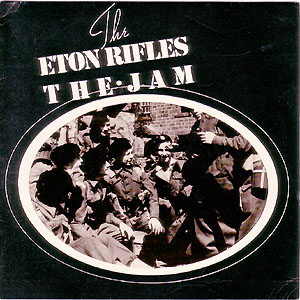The Eton Rifles
| "The Eton Rifles" | ||||
|---|---|---|---|---|
 | ||||
| Single by The Jam | ||||
| from the album Setting Sons | ||||
| B-side | "See-Saw" | |||
| Released | 26 October 1979 | |||
| Genre | Mod revival | |||
| Label | Polydor (UK) | |||
| Songwriter(s) | Paul Weller | |||
| Producer(s) | Vic Coppersmith-Heaven and the Jam | |||
| The Jam singles chronology | ||||
| ||||
| Alternative cover | ||||
| Music video | ||||
| "The Eton Rifles" on YouTube | ||||
"The Eton Rifles" is a song recorded by the Jam, written by Paul Weller. It was the only song to be released as a single from the album Setting Sons. Released on 26 October 1979, it became the band's first top-ten hit on the UK Singles Chart, peaking at No. 3.[1]
The song was recorded at Townhouse Studios, and produced by Vic Coppersmith-Heaven and the Jam. The single's B-side is "See-Saw".
Background
[edit]Eton College is an English public school located in Eton, Berkshire, and is regarded as the one of the most prestigious educational institutions in the United Kingdom.[2] Its cadet corps is the Eton College Combined Cadet Force, which was founded in 1860 as the Eton Volunteer Corps.[3]
David Cameron
[edit]In May 2008, Conservative leader and Old Etonian David Cameron named "The Eton Rifles" as one of his favourite songs. Cameron is reported to have said, "I was one, in the corps. It meant a lot, some of those early Jam albums we used to listen to. I don't see why the left should be the only ones allowed to listen to protest songs."[4] Cameron's praise for the song earned a scathing rejection from Paul Weller, who said, "Which part of it didn't he get? It wasn't intended as a fucking jolly drinking song for the cadet corps."[4]
In November 2011, The Guardian's music critic Alexis Petridis questioned Cameron further:[5]
You said the Jam's song Eton Rifles was important to you when you were at Eton. Paul Weller, who wrote the song, was pretty incredulous to hear this, and claimed you couldn't have understood the lyrics. What did you think that song was about at the time? Be honest.
Cameron replied:[5]
I went to Eton in 1979, which was the time when the Jam, the Clash, the Sex Pistols were producing some amazing music and everyone liked the song because of the title. But of course I understood what it was about. It was taking the mick out of people running around the cadet force. And he was poking a stick at us. But it was a great song with brilliant lyrics. I've always thought that if you can only like music if you agree with the political views of the person who wrote it, well, it'd be rather limiting.
In 1977, Weller had stated in the New Musical Express that people should vote for the Conservatives, a comment intended to shock and which later came back to haunt him during his long involvement with the Labour Party initiative Red Wedge. He added:[6][7]
I think I have pretty much nailed where I was at to the mast. But people come to gigs for different reasons: it isn't necessarily about what the person on stage is singing. But at the same time, you do think, "Well, maybe this'll change their minds."
Legacy
[edit]The song was ranked at number one among the top "Tracks of the Year" for 1979 by NME.[8] In 2022, it was included in the list "The story of NME in 70 (mostly) seminal songs", at number 16.[9]
References
[edit]- ^ Roberts, David (2006). British Hit Singles & Albums (19th ed.). London: Guinness World Records Limited. p. 277. ISBN 1-904994-10-5.
- ^ Bell, Dan (5 January 2017). "Eton: a Common Perception". BBC News. Retrieved 12 May 2017.
- ^ "CCF (Combined Cadet Force)". Etoncollege.com. Retrieved 6 April 2022.
- ^ a b Wilson, John. "Chasing the blues away". New Statesman. Retrieved 12 October 2016.
- ^ a b "David Cameron, we have a few questions for you…". The Guardian. 25 November 2011. Retrieved 12 October 2016.
- ^ Milmo, Cahal; McSmith, Andy (16 May 2008). "Musical fallout: politics and pop just don't mix". The Belfast Telegraph. Archived from the original on 5 July 2008. Retrieved 30 June 2008.
- ^ John Harris (18 March 2008). "David Cameron's Tories are trying to claim anti-Thatcherite rockers such as The Smiths and Paul Weller as their own". The Guardian. Retrieved 12 October 2016.
- ^ "Albums and Tracks of the Year". NME. 2016. Retrieved 9 November 2016.
- ^ Beaumont, Mark (7 March 2022). "The Story of NME in 70 (mostly) Seminal Songs". NME. Archived from the original on 7 March 2022. Retrieved 7 March 2022.